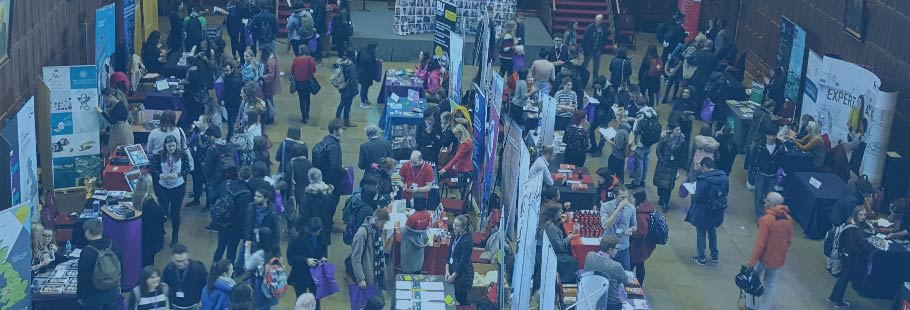How I Made the Most of Postgrad Fairs (and Found My PhD!)
Last year I was studying for my Masters degree and planning on doing a PhD afterwards. During that time I heard about postgraduate study fairs like Postgrad LIVE, because, why not? This would be a good chance to find out more about the projects I was interested in and their application process by asking my questions to the people that actually dealt with them.
Attending a fair helped me make sense of PhD study and eventually lead me to the PhD I’m now on. I’d definitely recommend the fair experience to you if you’re also considering a PhD soon. But, with so much going on at a postgraduate event, it’s worth knowing what to expect and planning to make the most of the day.
So here’s what a postgraduate study fair was like for me (and what I wish I had known about them):
Before I booked a place, I made sure to check who was going to be exhibiting at the fairs I considered, so I could choose to attend an event which would be more relevant to the positions I was interested in. I also wrote down any specific questions I had about projects/programmes/funding I was interested in. Finally, I took a couple of printed CVs just in case they were needed (I didn’t need them, but you never know!).
It can be tempting to focus on the universities you’re talking to at a postgraduate fair, but make sure to introduce yourself too and say what you are interested in. This will give the people you are talking to an indication of which programmes / projects / funding are more relevant to you and may even lead to them pointing you to new opportunities you weren’t aware of!
Whether you are extremely interested in a specific project, or checking out an institute you’ve never heard of, always smile: a smile can take you a long way. If you are polite people will be more likely to be open to your questions and willing to help you. Also, don’t forget that you may not know who you are talking to (at least, not at first). You might be chatting to someone with an important role in running the programmes you are interested in!
Don't be afraid to ask questions
If you have a question, ask it! It might be that the person doesn’t know the exact answer, but, as I found, they can always put you in touch with the person who does.
Asking questions and taking time to discuss your interests also established a point of contact with the university. This is always helpful during applications. If you are very interested in their university they might also give you an indication of how likely your application is to be successful – or offer some insider tips for putting together an impressive proposal.
If there is an opportunity for it, make a note of who you are talking to and exchange email contacts. This might give you a great way to continue to communicate with someone within the university and clarify any other questions or doubts you have in the future. Some exhibitors may be too busy to get back to individual students themselves, but, with your permission, they’ll be able to put you in touch with the relevant people in their admissions team.
Take advantage of the talks
Fairs will have interesting talks throughout the day. These cover things like application tips and funding, or provide insights into what it’s like to actually be a PhD student. Make sure you check out what’s on offer and note down the times for to the ones you are most interested in. However, don’t forget your main goal when going to the fair. If it is talking to several universities or a specific university make sure you do that!
Try to talk to as many people as you can
The biggest thing I learnt at postgraduate fairs is that browsing individual PhD titles on a website does not give you a complete picture of all the research going on at a university and that it is extremely easy to miss a project you might be interested in just because their title might have not been very appealing to you. Postgraduate fairs get around this by allowing you to have a conversation with universities, face-to-face.
So go ahead and talk to people from a range of universities, tell them what you are interested in, ask if they know of any research going on within that area and see what they have to say about other related topics their institution is currently specialising in.
Great networking during the fair means nothing if you don’t follow it up. If you give your contact to someone and they email you to follow up on a conversation, make sure to reply! I got contacted by someone I had talked to during the fair from my current university asking for a CV and my field of interest, so she could see whether there were any relevant projects. If I hadn’t replied I would have never known about the project I am currently on! So that paid off!
So prepare for the fair and enjoy yourself. If you’re like me, it could well help lead to your PhD. Even if not you will still get the chance to go to interesting talks and ask questions about applications to people that actually deal with them as their job. There will always be something useful to learn! Good luck! And may the funding odds be ever in your favour.
You may also like...

The Daily Life of a PhD StudentThis page will give you an idea of what to expect from your routine as a PhD student, explaining how your daily life will look at you progress through a doctoral degree.
Read more

 Continue with Facebook
Continue with Facebook







